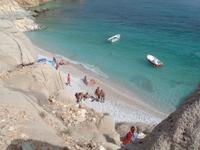 Welcome to Nikaria.gr!
Welcome to Nikaria.gr!
Nikaria.gr is the most complete guide to the beautiful island Ikaria. Here you will find all the information you need to visit us.
Explore our Island!
- Visit our villages
- Relax at our beaches
- Go to our feasts and drink our wine
- Learn about our mythology
- Visit our mineral springs
|
Latest articles for Ikaria:
 ·OUZERI NIGHT
·OUZERI NIGHT·Ikarian Centre - Greek language courses in Greece
·Psarotaverna Saturday Chapter Nea Ikaria Long Island
·Nea Ikaria BBQ and Meeting Saturday June 16th
·Hold em or Fold'em in Port Jeff Saturday March 3rd
·New English Language Book on Icaria Available
·Greek language courses in Ikaria, Easter Summer 2007
·Metal group with the name "Icaria"

 Ikaria:
Ikaria:
 History:
History:
 Activities:
Activities:
 Network:
Network:
